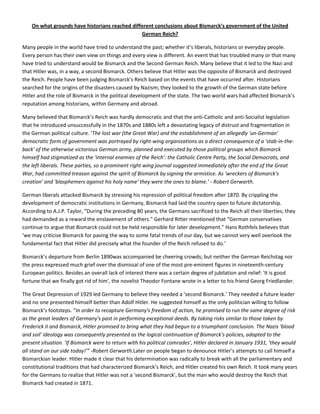On what grounds have historians reached different conclusions about bismarck
- 1. On what grounds have historians reached different conclusions about BismarckŌĆÖs government of the United German Reich? Many people in the world have tried to understand the past; whether itŌĆÖs liberals, historians or everyday people. Every person has their own view on things and every view is different. An event that has troubled many or that many have tried to understand would be Bismarck and the Second German Reich. Many believe that it led to the Nazi and that Hitler was, in a way, a second Bismarck. Others believe that Hitler was the opposite of Bismarck and destroyed the Reich. People have been judging BismarckŌĆÖs Reich based on the events that have occurred after. Historians searched for the origins of the disasters caused by Nazism; they looked to the growth of the German state before Hitler and the role of Bismarck in the political development of the state. The two world wars had affected BismarckŌĆÖs reputation among historians, within Germany and abroad. Many believed that BismarckŌĆÖs Reich was hardly democratic and that the anti-Catholic and anti-Socialist legislation that he introduced unsuccessfully in the 1870s and 1880s left a devastating legacy of distrust and fragmentation in the German political culture. ŌĆśThe lost war (the Great War) and the establishment of an allegedly 'un-German' democratic form of government was portrayed by right-wing organizations as a direct consequence of a 'stab-in-the- back' of the otherwise victorious German army, planned and executed by those political groups which Bismarck himself had stigmatized as the 'internal enemies of the Reich': the Catholic Centre Party, the Social Democrats, and the left liberals. These parties, so a prominent right wing journal suggested immediately after the end of the Great War, had committed treason against the spirit of Bismarck by signing the armistice. As 'wreckers of Bismarck's creation' and 'blasphemers against his holy name' they were the ones to blame.ŌĆÖ - Robert Gerwarth. German liberals attacked Bismarck by stressing his repression of political freedom after 1870. By crippling the development of democratic institutions in Germany, Bismarck had laid the country open to future dictatorship. According to A.J.P. Taylor, ŌĆ£During the preceding 80 years, the Germans sacrificed to the Reich all their liberties; they had demanded as a reward the enslavement of others.ŌĆØ Gerhard Ritter mentioned that ŌĆ£German conservatives continue to argue that Bismarck could not be held responsible for later development.ŌĆØ Hans Rothfels believes that ŌĆśwe may criticise Bismarck for paving the way to some fatal trends of our day, but we cannot very well overlook the fundamental fact that Hitler did precisely what the founder of the Reich refused to do.ŌĆÖ BismarckŌĆÖs departure from Berlin 1890was accompanied be cheering crowds; but neither the German Reichstag nor the press expressed much grief over the dismissal of one of the most pre-eminent figures in nineteenth-century European politics. Besides an overall lack of interest there was a certain degree of jubilation and relief: 'It is good fortune that we finally got rid of him', the novelist Theodor Fontane wrote in a letter to his friend Georg Friedlander. The Great Depression of 1929 led Germany to believe they needed a ŌĆśsecond Bismarck.ŌĆÖ They needed a future leader and no one presented himself better than Adolf Hitler. He suggested himself as the only politician willing to follow BismarckŌĆÖs footsteps. ŌĆ£In order to recapture Germany's freedom of action, he promised to run the same degree of risk as the great leaders of Germany's past in performing exceptional deeds. By taking risks similar to those taken by Frederick II and Bismarck, Hitler promised to bring what they had begun to a triumphant conclusion. The Nazis 'blood and soil' ideology was consequently presented as the logical continuation of Bismarck's policies, adapted to the present situation. 'If Bismarck were to return with his political comrades', Hitler declared in January 1931, 'they would all stand on our side today!'ŌĆØ -Robert Gerwarth.Later on people began to denounce HitlerŌĆÖs attempts to call himself a Bismarckian leader. Hitler made it clear that his determination was radically to break with all the parliamentary and constitutional traditions that had characterized BismarckŌĆÖs Reich, and Hitler created his own Reich. It took many years for the Germans to realize that Hitler was not a 'second Bismarck', but the man who would destroy the Reich that Bismarck had created in 1871.
- 2. Frederick the Great, brought about Prussia's powerful position through his military successes, the protection of acquisitions, the improvement of the army and the legal system, reorganizing the administration and establishing new settlement areas, and thus laid the foundations for the German Reich. Otto von Bismarck, founded first the North German Federation and then the German Reich, created the Triple Alliance with Austria and Italy, acquired colonies and thus made Germany into a great power. Adolf Hitler finally, put an end to the destruction of the German Reich by Marxism and Bolshevism, restored German national self-belief, and completed Bismarck's work - the unified nation-state, but created his own Reich. The historiography of BismarckŌĆÖs role portrayed him as the master statesman, successfully manipulating events in order to lead Germany to its rightful destiny.

